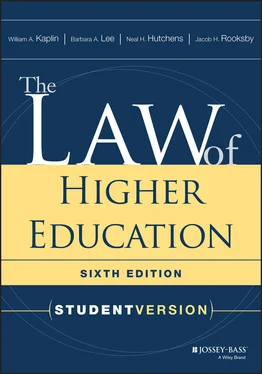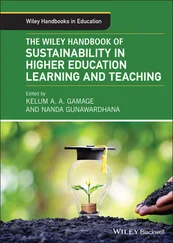In another case involving students, Mentavlos v. Anderson , 249 F.3d 301 (4th Cir. 2001), the court considered whether two cadets at the Citadel, a state military college, were engaged in state action when they disciplined a first-year (or “fourth-class”) cadet. The first-year cadet, a female who subsequently withdrew from the college, alleged that the two male, upper-class cadets had sexually harassed, insulted, and assaulted her using their authority under the “Fourth-Class System,” as described in the school's Cadet Regulations (the Blue Book), and thereby violated her right to equal protection under the Fourteenth Amendment. The regulations granted upper-class students limited authority to correct and report violations of school rules by first-year students. While hazing and discrimination based on gender as means of punishment for rules violations were expressly prohibited, punishments meted out by upper-class cadets might include mild verbal abuse or assignment to complete undesirable maintenance tasks. Ultimately, authority for observing the Citadel's rules rested with the college administration, not the upper-class cadets.
The appellate court affirmed the federal district court's decision that the upper-class students were not state actors and were not engaged in state action. Using the nexus approach, 7 the court emphasized that the upperclassmen enjoyed only limited disciplinary authority over students, authority that was not analogous to the broad discretionary powers of law enforcement officers. Moreover, the upperclassmen's actions were not authorized by the school and were in violation of the Blue Book rules, violations for which the cadets were disciplined. “Because the cadets' decision to engage in unauthorized harassment of [the plaintiff] was not coerced, compelled, or encouraged by any law, regulation or custom” of the state or the college, there was no “close nexus” between the cadets' action and the state, and the cadets were not state actors when they disciplined the plaintiff. 8 Although the facts of the Mentavlos case are somewhat unique, involving a military-style discipline system at a military college, the court made clear that its analysis could have some application to honor code systems and other disciplinary systems at other public colleges.
Husain v. Springer , 494 F.3d 108 (2d. Cir. 2007), provides another example of state action issues concerning students. A Student Government Publications Commissioner at a public university impounded copies of an issue of the student newspaper, and certain members of the student senate had supported this action. These students were among the defendants in a First Amendment suit brought by the newspaper editors and other students. (For analysis of the First Amendment issues in Husain , see Section 10.3.3.) The student defendants argued that they had not engaged in state action and therefore should be dismissed from the case. The district court and the appellate court agreed. The college did not compel or require the student defendants to impound the newspaper, nor did the college encourage this action. To the contrary, the college president had overruled the student government's action. Moreover, even if it could be said that college regulations and policies provided authorization for the students to act, “state authorization was insufficient to establish that the student government defendants were state actors in the circumstances presented here.” (For a contrary case, in which a court held student government members to be engaged in state action, see Amidon v. Student Association of the State University of New York at Albany , 399 F. Supp. 2d 136 (N.D.N.Y. 2005).)
The case of Limpuangthip v. United States , 932 A.2d 1137 (D.C. Ct. App. 2007), provides another example of state action issues concerning employees. A private university's search of a student's room had led to the student's conviction on drug charges, and the student argued that the search was state action violating the Fourth Amendment. The search had been conducted by a university administrator accompanied by two university police officers. The administrator was concededly a private actor, not subject to the Fourth Amendment, but the police officers, although employees of the university, were Special Police Officers (SPOs) under District of Columbia law, “authorized to exercise arrest powers broader than that of ordinary citizens and security guards.” The student claimed that this governmental authority of the SPOs present at the search made the search state action. The appellate court agreed that SPOs do become state actors when they invoke their state authority “through manner, word, or deed”—that is, when they act “like…regular police officer[s]” rather than employees of a private entity. But the two SPOs, according to the court, did not act in this manner at the search. The administrator had initiated and conducted the search herself; the SPOs had not influenced the administrator's actions; and their “involvement in the search was peripheral.” Their conduct therefore “does not amount to state action.”
Borrell v. Bloomsburg University , 870 F.3d 154 (3d Cir. 2017), considers when a private entity's relationship with a public institution may subject the private entity to a state action finding. The specific question was a whether a private health care provider that operated a nurse anesthesia program with a public university qualified as a state actor when it expelled a student from the program after she refused the initial request of a supervisor to take a drug test. The court determined that the supervisor's status as a joint employee of the university and the health care provider did not resolve the state actor question. Rather, according to the court, the “pertinent question” was whether the supervisor was wearing his university or private health care employer “hat” in deciding to dismiss the student from the program (870 F.3d at 160). The court said that the student was dismissed from the program on the basis of the health care provider's employee policies and not on a policy of the university. Furthermore, the agreement between the university and the health care provider specified that the health care provider retained discretion “unilaterally” to remove anyone from the program based on its employee policies, which applied to students in the nurse anesthesia program (870 F.3d at 161). Thus, the student was dismissed based on an employment policy over which the university exercised no control based on the collaboration agreement. As such, the court held that neither the health care provider nor the supervisor qualified as state actors. (See also Shapiro v. Columbia Union National Bank & Trust Co . 576 S.W.2d 310 (Mo. 1978) [twice dismissing complaints against a public university as failing to state a cause of actionin rejecting arguments that state action was present in the administration of a private scholarship trust fund in relation to the university's role in overseeing the scholarship and the trust].)
1.5.3 Other bases for legal rights in private institutions.The inapplicability of the federal Constitution to private schools does not necessarily mean that students, faculty members, and other members of the private school community have no legal rights assertable against the school. There are other sources for individual rights, and these sources may sometimes resemble those found in the Constitution.
The federal government and, to a lesser extent, state governments have increasingly created statutory rights enforceable against private institutions, particularly in the discrimination area. The federal Title VII prohibition on employment discrimination (42 U.S.C. §§ 2000e et seq., discussed in Section 4.5.2.1), applicable generally to public and private employment relationships, is a prominent example. Other major examples are the Title VI race discrimination law (42 U.S.C. §§ 2000d et seq.) and the Title IX sex discrimination law (20 U.S.C. §§ 1681 et seq.) (see Sections 11.5.2 through 11.5.3 of this book), applicable to institutions receiving federal aid. Such sources provide a large body of nondiscrimination law, which parallels and in some ways is more protective than the equal protection principles derived from the Fourteenth Amendment.
Читать дальше












